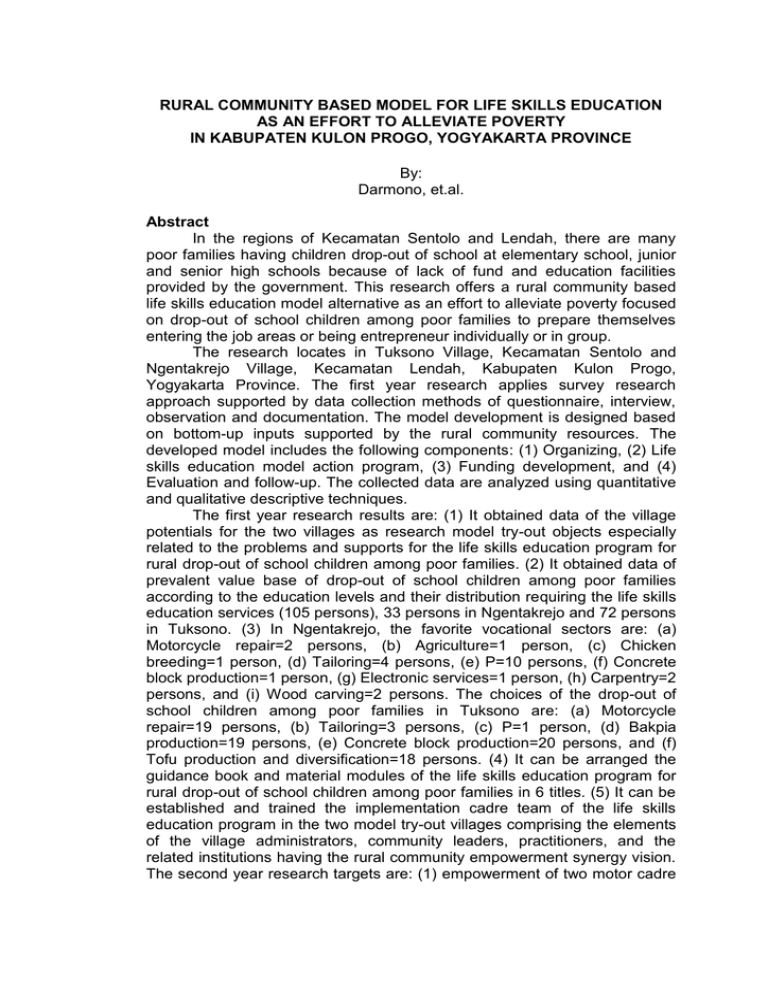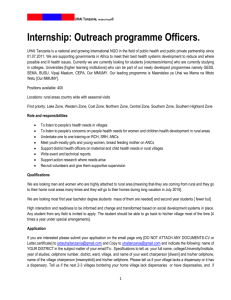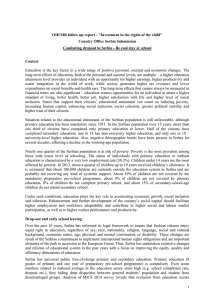RURAL COMMUNITY BASED MODEL FOR LIFE SKILLS EDUCATION
advertisement

RURAL COMMUNITY BASED MODEL FOR LIFE SKILLS EDUCATION AS AN EFFORT TO ALLEVIATE POVERTY IN KABUPATEN KULON PROGO, YOGYAKARTA PROVINCE By: Darmono, et.al. Abstract In the regions of Kecamatan Sentolo and Lendah, there are many poor families having children drop-out of school at elementary school, junior and senior high schools because of lack of fund and education facilities provided by the government. This research offers a rural community based life skills education model alternative as an effort to alleviate poverty focused on drop-out of school children among poor families to prepare themselves entering the job areas or being entrepreneur individually or in group. The research locates in Tuksono Village, Kecamatan Sentolo and Ngentakrejo Village, Kecamatan Lendah, Kabupaten Kulon Progo, Yogyakarta Province. The first year research applies survey research approach supported by data collection methods of questionnaire, interview, observation and documentation. The model development is designed based on bottom-up inputs supported by the rural community resources. The developed model includes the following components: (1) Organizing, (2) Life skills education model action program, (3) Funding development, and (4) Evaluation and follow-up. The collected data are analyzed using quantitative and qualitative descriptive techniques. The first year research results are: (1) It obtained data of the village potentials for the two villages as research model try-out objects especially related to the problems and supports for the life skills education program for rural drop-out of school children among poor families. (2) It obtained data of prevalent value base of drop-out of school children among poor families according to the education levels and their distribution requiring the life skills education services (105 persons), 33 persons in Ngentakrejo and 72 persons in Tuksono. (3) In Ngentakrejo, the favorite vocational sectors are: (a) Motorcycle repair=2 persons, (b) Agriculture=1 person, (c) Chicken breeding=1 person, (d) Tailoring=4 persons, (e) P=10 persons, (f) Concrete block production=1 person, (g) Electronic services=1 person, (h) Carpentry=2 persons, and (i) Wood carving=2 persons. The choices of the drop-out of school children among poor families in Tuksono are: (a) Motorcycle repair=19 persons, (b) Tailoring=3 persons, (c) P=1 person, (d) Bakpia production=19 persons, (e) Concrete block production=20 persons, and (f) Tofu production and diversification=18 persons. (4) It can be arranged the guidance book and material modules of the life skills education program for rural drop-out of school children among poor families in 6 titles. (5) It can be established and trained the implementation cadre team of the life skills education program in the two model try-out villages comprising the elements of the village administrators, community leaders, practitioners, and the related institutions having the rural community empowerment synergy vision. The second year research targets are: (1) empowerment of two motor cadre to manage the life skills education program, (2) the trained of 50 persons of drop-out of school children among poor families, (3) established productive business groups in the rural villages according to the mastered skills, and (4) the observed success levels, model constraints and effectiveness, and the follow –up of the life skills education program for the rural drop-out of school children among poor families in the research areas. Key words: life skills, poverty alleviation, and rural.




